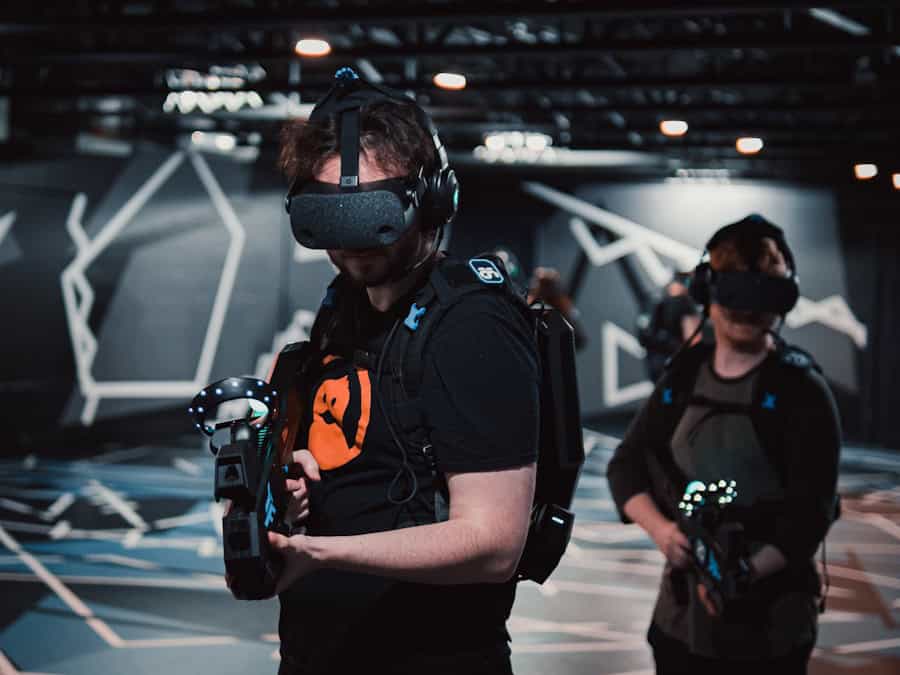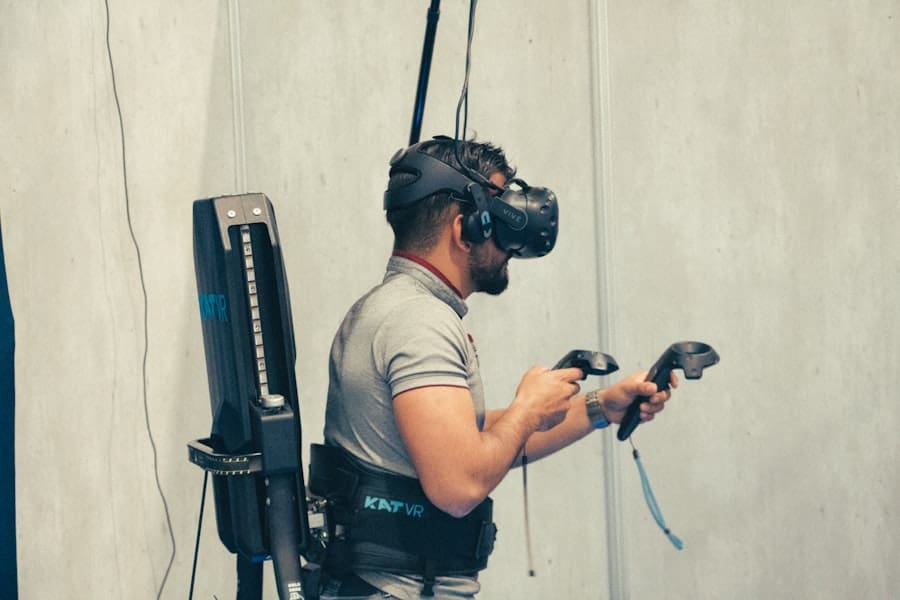The concept of the Metaverse has evolved from a niche idea in science fiction to a burgeoning reality that encompasses a vast array of digital experiences. It represents a collective virtual space where users can interact with each other and digital environments in real-time, often through the use of avatars. This immersive universe is not limited to gaming; it extends to social interactions, commerce, education, and even virtual real estate.
The Metaverse is characterized by its persistent nature, meaning that it continues to exist and evolve even when users log off. This continuity creates a sense of presence and community that is unique to virtual environments. As technology advances, the Metaverse is becoming increasingly sophisticated, integrating elements such as augmented reality (AR), virtual reality (VR), and blockchain.
These technologies work in tandem to create a seamless experience that blurs the lines between the physical and digital worlds. The rise of social media platforms and online gaming has laid the groundwork for this expansive digital landscape, allowing users to engage in shared experiences that transcend geographical boundaries. As we delve deeper into the Metaverse, it becomes essential to explore the role of artificial intelligence (AI) in shaping interactions, content creation, personalization, and ethical considerations within this new frontier.
Key Takeaways
- The Metaverse is a virtual reality space where users can interact with a computer-generated environment and other users.
- AI in the Metaverse refers to the use of artificial intelligence to enhance and manage user experiences, interactions, and content creation.
- AI in the Metaverse can help manage interactions by providing personalized and contextually relevant experiences for users.
- Content creation and curation in the Metaverse can be enhanced with AI, allowing for the creation of dynamic and engaging virtual environments.
- Personalization and customization in the Metaverse with AI can lead to more immersive and tailored experiences for users.
Understanding AI in the Metaverse
Enhancing User Interactions
For instance, AI can facilitate natural language processing, enabling users to communicate with non-player characters (NPCs) or other users in a more human-like manner. This capability not only enriches gameplay but also fosters deeper social connections among participants. Moreover, AI plays a crucial role in creating dynamic environments that respond to user behavior.
Adaptive Virtual Environments
By employing machine learning techniques, developers can design virtual worlds that adapt based on user preferences and actions. For example, if a user frequently engages in certain activities or explores specific areas within the Metaverse, AI can modify the environment to enhance those experiences. This adaptability ensures that users remain engaged and invested in their virtual interactions, ultimately contributing to a more vibrant and interactive Metaverse.
Real-Time Adjustments and Improvements
The ability of AI to analyze vast amounts of data in real-time allows for continuous improvements in the Metaverse. As users interact with the virtual environment, AI algorithms can identify areas that require adjustment, making the experience more enjoyable and immersive. This real-time feedback loop enables developers to refine and perfect the Metaverse, creating a more engaging and dynamic virtual world.
The Future of the Metaverse
The integration of artificial intelligence in the Metaverse has the potential to revolutionize the way we interact with virtual environments. As AI technology continues to evolve, we can expect to see even more sophisticated and immersive experiences in the Metaverse. With its ability to enhance user interactions, create adaptive environments, and facilitate real-time adjustments, AI is poised to play a vital role in shaping the future of the Metaverse.
Managing Interactions in the Metaverse with AI

The management of interactions within the Metaverse is significantly enhanced by AI technologies. One of the most notable applications is in the realm of moderation and community management. As virtual spaces grow in popularity, they also attract diverse user bases, which can lead to challenges such as harassment or inappropriate behavior.
AI-driven moderation tools can analyze user interactions in real-time, identifying harmful behavior patterns and flagging them for review or automatic intervention. This proactive approach helps maintain a safe and welcoming environment for all users. In addition to moderation, AI can facilitate more meaningful interactions among users by providing context-aware suggestions and recommendations.
For instance, if two users share similar interests or have engaged in comparable activities within the Metaverse, AI can suggest they connect or collaborate on projects. This capability not only enhances social engagement but also fosters a sense of community among users who might not have otherwise crossed paths. By leveraging AI to manage interactions effectively, the Metaverse can cultivate an inclusive atmosphere that encourages collaboration and creativity.
Content Creation and Curation in the Metaverse with AI
Content creation within the Metaverse is an expansive field that benefits immensely from AI technologies. The ability to generate immersive experiences relies heavily on the integration of AI tools that assist creators in designing environments, characters, and narratives. For example, procedural generation algorithms can be employed to create vast landscapes or intricate structures with minimal human input.
This technology allows developers to produce rich content at scale, ensuring that users have access to diverse experiences within the Metaverse. AI also plays a pivotal role in content curation, helping users discover relevant experiences tailored to their interests. By analyzing user behavior and preferences, AI algorithms can recommend specific games, events, or virtual spaces that align with individual tastes.
This personalized approach not only enhances user satisfaction but also encourages exploration within the Metaverse. For instance, if a user frequently participates in art-related activities, AI might suggest virtual galleries or workshops that align with their interests. This level of curation transforms the way users interact with content, making their experiences more engaging and fulfilling.
Personalization and Customization in the Metaverse with AI
Personalization is a key aspect of user experience in the Metaverse, and AI technologies are at the forefront of this transformation. By leveraging data analytics and machine learning algorithms, platforms can create tailored experiences that resonate with individual users. For instance, avatars can be customized not only based on aesthetic preferences but also on behavioral traits derived from user interactions.
This level of personalization fosters a deeper connection between users and their digital representations, enhancing their overall engagement within the Metaverse. Furthermore, AI-driven personalization extends beyond avatars to encompass entire virtual environments. Users may find that their surroundings adapt based on their preferences or past behaviors.
For example, if a user frequently visits a particular type of venue—such as a concert hall or an art gallery—the Metaverse could automatically suggest similar locations or events that align with their interests. This dynamic customization ensures that each user’s experience is unique and continually evolving, making them feel more invested in their virtual journey.
Ethical and Privacy Considerations in AI-managed Metaverse Interactions

Importance of Transparency
The collection and analysis of user data are crucial for creating personalized experiences in the Metaverse. However, this raises concerns about data usage and protection. Users have the right to know what data is being collected, how it will be used, and who has access to it. Transparency is vital in building trust between users and platform providers, and it is essential for fostering a healthy and safe community.
Challenges of AI-Driven Moderation
The use of AI-driven moderation and interaction management in the Metaverse also raises ethical dilemmas. While automated systems can effectively identify harmful behavior, there is a risk of overreach or misinterpretation of context. For instance, an innocent comment could be flagged as inappropriate due to algorithmic bias or misunderstanding of cultural nuances. This highlights the need for a balanced approach to moderation, one that maintains a safe environment while respecting individual expression.
Striking a Balance
Striking a balance between maintaining a safe environment and respecting individual expression is crucial for fostering a healthy community within the Metaverse. This requires careful consideration of the potential risks and benefits of AI-driven moderation and interaction management. By prioritizing transparency, accountability, and user safety, platform providers can create a trustworthy and secure environment that promotes healthy interactions and respectful dialogue.
Future of the Metaverse
Ultimately, the future of the Metaverse depends on the ability of platform providers to address ethical and privacy considerations while promoting a culture of transparency and accountability. By doing so, they can create a secure, trustworthy, and inclusive environment that allows users to thrive and interact in a healthy and respectful manner.
The Future of AI in the Metaverse
The future of AI in the Metaverse holds immense potential for innovation and transformation across various domains. As technology continues to advance, we can expect more sophisticated AI systems capable of creating hyper-realistic environments and facilitating seamless interactions among users. The integration of advanced natural language processing will enable even more nuanced conversations between users and NPCs, making virtual interactions feel increasingly authentic.
Additionally, as machine learning algorithms become more adept at understanding user preferences and behaviors, personalization will reach new heights. Future iterations of the Metaverse may feature fully adaptive environments that evolve based on collective user input rather than just individual preferences. This communal approach could lead to dynamic spaces where users collaboratively shape their surroundings in real-time, fostering a sense of ownership and shared experience.
The Impact of AI on the Metaverse
The integration of artificial intelligence into the Metaverse is reshaping how users interact with digital environments and each other. From enhancing communication through natural language processing to enabling personalized experiences that adapt to individual preferences, AI is at the heart of this digital revolution. As we continue to explore this expansive universe, it is essential to navigate the ethical implications and privacy concerns that arise from these advancements.
The impact of AI on the Metaverse extends beyond mere functionality; it fundamentally alters our understanding of community, creativity, and connection in digital spaces. As we look ahead, it is clear that AI will play an instrumental role in defining the future landscape of the Metaverse—one that promises to be more immersive, engaging, and inclusive than ever before.
In a recent article discussing the best Android apps for 2023, the importance of technology in shaping our digital experiences is highlighted. This is particularly relevant when considering the role of AI in managing interactions and content in the Metaverse. As we navigate through virtual worlds and engage with various forms of media, the integration of artificial intelligence becomes crucial in enhancing user experiences and streamlining content delivery. By understanding the capabilities of AI and its potential applications, we can better appreciate its significance in shaping the future of the Metaverse.
FAQs
What is the Metaverse?
The Metaverse is a collective virtual shared space, created by the convergence of virtually enhanced physical reality and physically persistent virtual reality.
What is AI?
AI, or Artificial Intelligence, refers to the simulation of human intelligence in machines that are programmed to think and act like humans.
How does AI manage interactions in the Metaverse?
AI in the Metaverse can manage interactions by analyzing user behavior, preferences, and data to personalize experiences, provide virtual assistance, and facilitate communication between users.
How does AI manage content in the Metaverse?
AI in the Metaverse can manage content by curating and recommending personalized virtual experiences, creating and moderating virtual environments, and generating and optimizing virtual content.
What are the benefits of using AI in managing interactions and content in the Metaverse?
The benefits of using AI in the Metaverse include personalized experiences, efficient content curation, enhanced virtual communication, and improved user engagement.
What are the potential challenges of using AI in managing interactions and content in the Metaverse?
Challenges of using AI in the Metaverse may include privacy concerns, ethical considerations, potential biases in AI algorithms, and the need for effective regulation and oversight.

